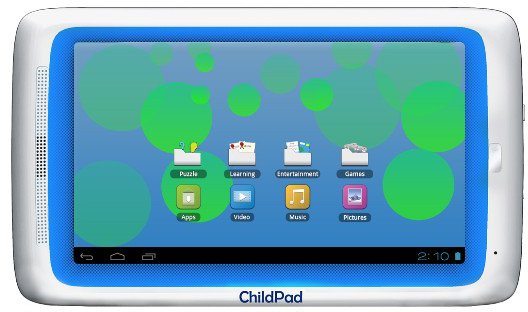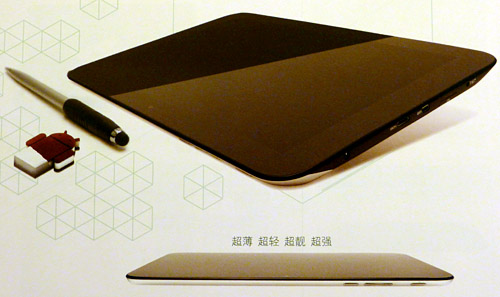Rockchip announced their next generation mobile processor at Mobile World Congress, in Barcelona, Spain. The Rockchip RK30xx series (RK3018?) features a dual core Cortex A9 clocked up to 1.4 GHz coupled with an ARM Mali-400 GPU and targets low cost Android 4.0 tablets. The Rockchip RK30xx platform features: Dual-core ARM Cortex-A9 processor with up to 1.4GHz speed, implemented with Artisan Processor Optimization Pack (POP) Quad-core ARM Mali-400 MP GPU, supporting OpenGL ES 1.1/2.0 and OpenVG 1.1 Full memory support, including DDRIII, DDRII, and LPDDRII High performance dedicated 2D processor 1080P multi-format video decoder 1080P video encoding for H.264 and vp8 Stereoscopic 3D H.264 MVC video codec Embedded HDMI 1.4a, supporting 3D display Embedded 60bit/s ECC, supporting MLC NAND, E-MMC, i-NAND and booting Support of dual panel display and dual camera Rockchip also said the complete BSP is already available for the chip. This company does not usually release BSP publicly […]
Archos Announces 129 USD Android 4.0 Child Pad Tablet
Archos announced the Child Pad, an Android 4.0 (ICS) Tablet with a 7″ capacitive touchscreen featuring an unnamed 1 GHz Cortex A8 processor (possibly a Rockchip RK2918) with 1GB of RAM, 4 GB internal storage and an SD slot for up to 32GB. This tablet aimed at kids includes access to the Kids App Store – powered by AppsLib – with 14 categories and over 10,000 apps including games, entertainment, communication, multimedia, books, comics and sports. As you can see in the picture above, the user interface has been customized to be “kid-friendly” with colored icons, home screen folders with direct access to games, entertainment, learning and puzzles. The device will come pre-loaded with 28 “kids’ apps” including Angry Birds, Pig Rush and Flight Frenzy. Archos has also designed the Child Pad to comply with CIPA (pronounced like SIPA?) and COPPA US regulations in order to “ensuring a safe tablet […]
Texas Instruments OMAP5 Demo at MWC 2012
Charbax of armdevices.net has uploaded a very interesting video with an OMAP5430 demo and an interview at Texas Instruments booth at MWC 2012. Using the OMAP5 development kit, they demo several 3D applications, the web browser and the picture gallery and it looks extremely smooth. They discussed about the OMAP5 vs Tegra 3 benchmark, and it appears mobile web browsers are not yet optimized for more than 2 cores which could explain the performance difference somewhat. The OMAP5 currently runs at 800 MHz, but there will eventually be 2 versions: 1.7 and 2.0 GHz when the OMAP 5 AP is released. This should show a performance improvement of over 4x against the Tegra 3, although I’m sure in the meantime, Nvidia will have announced the Tegra 4 (Wayne). The OMAP 5 also offers impressive improvement in power consumption, as the SGX544 GPU cores are augmented by a dedicated 2D hardware-accelerated […]
HiSilicon Unveils Quad-Core Cortex A9 K3V2 Processor (Hi3620)
HiSilicon, a subsidiary of Huawei, has unveiled the K3V2 quad-core cortex A9 processor at mobile world congress 2012, Barcelona. The processor comes in two version 1.2 and 1.5 GHz and the company claims the chip delivers 30 to 50 percent more performance than existing quad-core processor including the NVidia Tegra3. This performance boost is apparently possible thanks to a 64-bit memory bus as well as a powerful 16-core GPU (by an unnamed US chip designer) that is at least twice as fast as the competition. The current versions of the chip are manufacturer using TSMC 40 nm low power process, but the company plans to move to 28-nm technology for further power efficiency later this year. They do not use a companion core like the NVidia Tegra 3 to save power, but instead HiSilicon designed an A.I.PS (Artificial Intelligence Power Scaling) Core in K3V2, which can manage cores CPU and […]
Status of Embedded Linux – ELC 2012
Tim Bird, software engineer at Sony, discusses recent development in embedded Linux at the Embedded Linux Conference 2012. Abstract: Tim discusses changes to the kernel, improvements to embedded-related sub-systems, and new industry initiatives likely to affect embedded Linux developers in the future. Also, Tim discusses the direction of the Linux Foundation CE Workgroup, and their contract work and projects for this year. Last year highlights are also discussed, as well as ways to continue to improve Linux going forward. Here are the key points of this presentation: Linux Kernel Version changes: 2.6.38 to 3.3-rc3 Technology Areas: Bootup Time – With improvement in the kernel, bootloader and user-space Graphics – 2D/3D implementation. New /dev/ion and CMA graphics stuffs Accelerated Rendering – e.g. Renderscript Graphics Drivers – e.g. PowerVR Multimedia – Gstreamer, Android Media Layer (stagefright) and codec wars (e.g. patent issues with WebM/VP8 that interferes open source licenses). File systems – […]
Linaro 12.02 Release with Kernel 3.3-rc
Linaro has just released version 12.02 based on Linux Kernel 3.3-rc and Android 4.0.3. Among the key points, they have started to work on Freescale i.MX6 SabreLite board, included libav 0.8 to Ubuntu images which provides up to 160% performance improvement while playing real-media videos and XBMC is available via PPA. Here are the highlights of the release: Android Linaro Android can now be built with current GCC 4.7 snapshots. A 4.7 based toolchain build preview is also available. Linaro Android can boot on iMX6 Sabrelite boards. All test result spreadsheets have been streamlined and are now easier to use. Bluetooth enablement have been completed for the Origen board. A Prototype of using camera on Snowball was made. Presentations Given by Linaro Android Team this cycle “Binary Blobs Attack!!!” – Embedded Linux Conference. “What Android and Embedded Linux can learn from each other” – Embedded Linux Conference. “Integrating Projects Using […]
Android Builder Summit and Embedded Linux Conference 2012 Videos
The Android Builders Summit and the Embedded Linux Conference took place on February 13-17 2012, in San Francisco. The Linux Foundation has now posted videos of the talks as well as presentation slides on their website. Android Builder Summit 2012 Buildbot and Gerrit Integration, Improved CI Automation Using Android Outside the Mobile Phone Space The Android Ecosystem Case Study of Android Ice Cream Sandwich Rapid Bringup Towards a Standard Audio HAL for Android Topics in Designing An Android Sensor Subsystem: Pitfalls and Considerations A Novel Approach to In-Vehicle Infotainment (IVI) Based on Android Android Services Black Magic The Case For Security Enhanced (SE) Android Hardware and Android App Testing & Tuning Exposing the Android Camera Stack Usable Hardware Security for Android on ARM devices Using OpenOCD JTAG in Android Kernel Debugging The AllJoyn Open Source Project ADB: (Android Debug Bridge) : How It Works Android OTA Software Updates USB Device […]
Ziilabs Unveils HanZpad Android 4.0 Tablet Reference Design
ZiiLABS, a subsidiary of Creative Technology, has announced the HanZpad platform, a tablet reference design based on ZiiLABS ZMS-40 StemCell Media Processor (4 ARM Cortex A9 cores and 96 GPU cores) optimized for Android 4.x (ICS) and a Chinese operating system. The HanZpad platform is built around Ziilabs ZMS-40 processors with four 1.5GHz ARM Cortex-A9 CPUs and 96-core for the GPU. The ZMS-40 SoC supports H.264 HP decoding of up to 3840×1080 for true 1080p 3D stereo, and 2560×1600 (WQXGA) display resolution support. The firmware can also be upgraded to support for High Efficiency Video Coding (HEVC) aka H.265 which can increase data compression ratio by up to 2 times compared to H.264. Beyond the ZMS-40 processor, the key features of the tablet are as follows: 10.1-inch, 1,280 x 800-pixels IPS panel 1GB memory micro SDHC slot (up to 64GB) Wi-Fi and Bluetooth connectivity 22-hour battery life (~1W power consumption) […]





